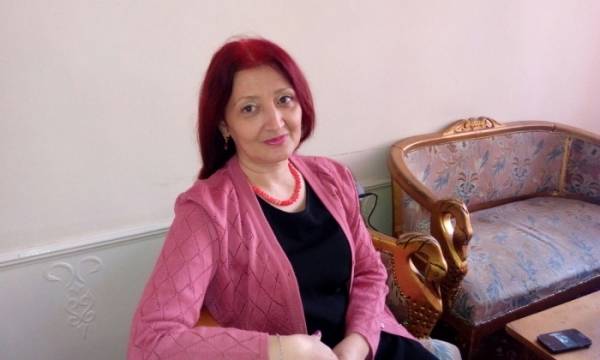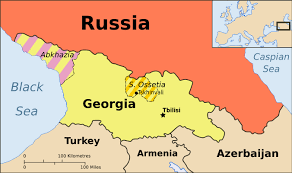Gulnara Inandzh
Director
International Online Information Analytic Center Ethnoglobus
RELATED INFO
https://www.turkishnews.com/ru/content/
The visit of Israeli Foreign Minister Avigdor Lieberman to Baku on February 8-11, which has attracted so much comment and speculation, is a constituent part of Tel Aviv’s policy in the post-Soviet space. An analysis of the results of this visit shows that the resonance arising from the Baku meetings of the Israeli minister serves only as a cover for the discussion behind the scenes of issues, which have strategic geopolitical importance.
Azerbaijani and Israeli media in their discussion of these meetings devoted most of their attention to several questions, including the broadening of Azerbaijani-Israeli ties at a time when contacts between Ankara and Jerusalem are increasingly tense, Azerbaijani permission for Israeli use of the territory of the country in the event of military actions against Iran, and a mediating role of official Baku in the Palestinian-Israeli peace talks. The links among these various issues become obvious upon close examination.
As far as the first question is concerned, one should note that Israel and part of the Jewish lobby, which has spoken out against military actions in Iran, do not consider the territory of Azerbaijan as a place des armes for military actions against Iran. Related to this and as part of an effort designed to restrain Iran, the United States and Georgia have signed an agreement on the use of Georgia’s territorial waters in the Black Sea if US military bases in the Persian Gulf are used for an attack on Iran.
Correctly assessing the situation, Israeli political analysts understand that Azerbaijan will not under any circumstances agree to the use of its territory for an invasion of Iran but rather will do everything it can to prevent the beginning of military actions against its southern neighbor. Any military invasion, be it a broad scale military action or surgical strike, would entail a humanitarian catastrophe (including an incalculable number of refugees from the northern part of Iran), a collapse of the economy, and a growth of terrorism in Azerbaijan. These threats in turn are entirely capable of delivering a destructive blow to the security of Azerbaijan. Consequently, official Baku cannot agree to such a step even in exchange for the resolution of the Nagorno-Karabakh conflict.
There is, however, a plethora of other issues that invite attention of Baku and Tel Aviv, as well as Ankara, and could hence serve as a solid foundation upon which the relations among the three could develop further. Since Lieberman’s visit to Baku, there have been several extremely interesting events. On February 16, Pinchas Avivi, the deputy director general of the Israeli Foreign Ministry and head of that organization’s Division for Central Europe and Eurasia, made a working visit to Ankara. Not only did the two parties discuss bilateral relations, but they also touched upon the issues of cooperation and interaction in “third countries,” in particular those in the South Caucasus (Goldenstein 2010). That suggests that the meeting in Ankara represented a continuation of the Baku negotiations. The possibility of tripartite cooperation in dealing with the regional issues at a time when Turkish-Israeli relations appear to be in “conflict” is not fantastic if one comes to analyze more closely recent events. Despite a certain public cooling in recent months, both countries have enough in common that cooperation with regard to regional issues is far from impossible. As one Turkish official put it, “populism is part of contemporary politics,” but “Turkey was and remains a most serious guarantor of Israel’s security” (Oguz 2010).
Consequently, while some experts have hurried to bury the Azerbaijan-Israel-Turkish military-political union, it is obvious that precisely this union and not individual states are capable of being a key geopolitical center and playing a defining role in the region. And local conflicts, which are taking place in these countries, are considered not in isolation but as part of regional policies.
This nexus also reflects Azerbaijan’s interest in playing a larger international role. Indeed, many countries hope that it will. In May 2009, for example, when Azerbaijani Foreign Minister Elmar Mammadyarov was in Washington, US Secretary of State Hillary Clinton said that Azerbaijan could take on itself greater responsibility and leadership in the resolution of important issues in the region of the South Caucasus. She stressed that “Azerbaijan is a strategic location which is important not only for Azerbaijanis, but also for the region and the entire world,” including not unimportantly not only the Caucasus but the areas to its south. [1]
Not surprisingly, therefore, during Lieberman’s visit to Baku, the two parties discussed in detail the possibility of Azerbaijan’s mediating role in the Israeli-Palestinian conflict. Baku’s growing interest in playing a greater role in the broader region to its south is also reflected in its continuous reluctance to open up its embassy in Tel Aviv. Experts in Baku often cite relations with the Organization of the Islamic Conference and with Iran as the reasons Azerbaijan has not taken that step, but the experience of Turkey and Israel suggests that in reality there is another reason at work: a desire, on the part of Baku, to demonstrate its respect for, and solidarity with, the Palestinians and the Islamic world more generally, something which will help increase the influence of Azerbaijan as a mediator in the Middle Eastern conflict.
As the situation around the region heats up, the links between Azerbaijan, Turkey and Israel seem certain to become closer, and this axis is destined to bear a direct effect on the broader region for years to come.
Note
[1] See (accessed 25 February 2010).
References
Goldenstein, Alexander (2010) “Турция и Израиль сохраняют координацию по Кавказу” [“Turkey and Israel keep coordination on the Caucasus”], Izrus, 17 February, available at http://izrus.co.il/dvuhstoronka/article/2010-02-17/8651.html (accessed 25 February 2010).
Oguz, Dzhem (2010) “Есть причины, вынудившие Турцию изменить отношение к Израилю” [“There are reasons that prompted Turkey to change its attitude to Israel”], Regnum, 11 February, available at (accessed 25 February 2010).
source



 Azerbaijani Defense Minister Safar Abiyev, 2004
Azerbaijani Defense Minister Safar Abiyev, 2004


